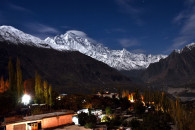Surviving breast cancer in Pakistan
Healthy diet, exercise and support by loved ones is the quickest way for a survivor to return to her former self.

Surviving breast cancer in Pakistan
“People need to understand that breast cancer is not a punishment, but a disease like many others and needs to be treated accordingly."
A 68-year-old, visiting lecturer at Kinnaird College for Women, Zarina was head of the department of Urdu at the college, in 2009, when she felt a cyst in her left breast. She was aware of the change in her body, but could not spare time for a mammography. It wasn’t until Pink Ribbon opened a free mammography camp at her college that she tested positive for breast cancer. Luckily her cancer was detected in the first year, which not only saved her life, but also spared her from several difficult stages of the treatment.
Zarina went to Chicago to get treatment, after her initial biopsy at Shaukat Khanum Memorial Cancer Hospital. She insists that the facilities at INMOL and SKMCH are at par with the global standards.
“Support and encouragement helped in my healing”, says Mrs Ashraf, another breast cancer survivor since 1991.
These women are the lucky few who got help at a time, where it was possible to treat and cure them.
“Most of the breast cancer patients that come to our walk-in clinic are at an advanced stage of the disease,” says Dr Neelum Siddiqui, head of medical oncology at SKMCH.
Siddiqui says more people need to get their self-examination done, and the doctors need to be able to identify a problem. This requires training at the grass root level, so that people can be directed to experts.
Oncologists and surgeons claim that they have started seeing more and more females in their 30s and even 20s with breast cancer in Pakistan. Various studies show that the average age in Pakistan for a female breast cancer patient lies between 45 and 50 years.
Over 44% of the women who went to SKMCH for treatment in 2011 suffered from malignancy in their breasts. Incidence of female breast cancer in 2011 is greater than the combined number of the malignancies found in both sexes and all age groups. Over the years the doctors have seen a stark increase in the number of breast cancer patients. At INMOL, 4,087 patients of breast cancer were registered.
While age and gender are the biggest risk factors in breast cancer, genetics also play a role.
According to Dr Usman Rasheed of SKMCH Research Center, females can also carry the BRCA 1 and BRCA 2 genes from the male member of the family, for instance the father,
Most developed countries have national screening programs for early detection and cancer registries, which collect data for research and treatment of cancer patients. Unfortunately, in Pakistan there is still a dire need for the authorities to set up similar prevention schemes that can save women from this silent killer. According to experts, one of the most effective ways to educate women in rural areas about the disease and help them with self-examination is through lady heath visitors.
In addition to early detection, experts also emphasize that development of facilities for care and management of those diagnosed with breast cancer is crucial. To achieve this Pakistan needs a network of dedicated diagnostic breast clinics and at dedicated breast care centers, preferably as part of tertiary care public sector hospitals.
However, Pakistan has come a long way from the time when Pink Ribbon workers were told they could not use the word ‘breast’ during awareness campaigns in different cities, says Assistant Manager Operations of Pink Ribbon, Muhammad Hanif. But the complications due to cultural conservatism still persists as the organization faces censorship in educational institutions and other forums till date.
Hanif also said that that due to an increase in awareness, local dealers like Kodak and Fuji were having difficulties to meet the demand for film used in mammography.
Survivors say that in order to live full lives, myths like losing your looks and hair need to be countered. Healthy diet, exercise and support by loved ones is the quickest way for a survivor to return to her former self.



















COMMENTS
Comments are moderated and generally will be posted if they are on-topic and not abusive.
For more information, please see our Comments FAQ